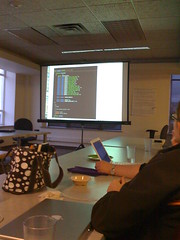
At Code-n-Splode last night, we first heard Christie Koehler give a great talk on CodeIgniter, the one PHP web framework endorsed by Rasmus Lerdorf, original author of PHP. She went over the pros/cons, details of how you go about installing and then using CodeIgniter, and then showed a very detailed example from her recent work. I hope she posts the slides soon – they were great. (If you want to see our tweets – per Gabrielle’s suggestion, we’re tagging with #cns now.)
After the talk (nearly 9pm!) we all went over to the Green Dragon for our #afterhours chat. Audrey led off by explaining the recent controversy she’d written about, and the Ruby/Rails community response to her posts.
Some of the things she shared I was shocked by – specifically some very personal attacks in comments that she’d decided to save (in Skitch), but remove from her posts. Her standard was: “is this something that would cause my mom to stop reading.” And, if the comment met that standard, she archived and removed it.
I learned about threads in the local ruby community about the topic of women’s participation, and some very positive comments on Hacker News and Digg, and _why’s posts that seem to be expanding perceptions and opening people’s minds to ways that may ultimately be more inclusive of women and minorities.
All told, we had 15 people at the meeting, 13 of which were women. Our first Code-n-Splode meetings started with about five people. Our largest meeting (thanks to the clever, rocket-building Sarah Sharp) had somewhere around 30 people.
Among the many things that the Code-n-Splode crew discussed last night was “what made portland different”. And I thought I’d let you in on our secret.
We ask women to participate.
When we have code sprints for Calagator, Open Source Bridge or we have the Agile development meetups dedicated to coding – there are always women there. From what I understand, having women show up regularly to code sprints is unusual in other cities.
When I am responsible for these meetups, I contact the people that I want to attend directly – and I ask them to come. This is a mix of women and men (I no longer have to explicitly think about inviting women, because so many are already in the community). But when I was first asking people, I *did* have to contact women who were just dipping a toe into the community — to convince them that yes, joining us would be fun, educational and sometimes good for their careers.
When I first started attending user groups regularly about nine years ago, I often was the only woman. Now, it is extremely rare for me to be the only one. Particularly in groups that span multiple technologies (Web Innovators, Open Source Bridge, Extreme/Agile developers, Functional programming, and BarCampPortland come to mind) or are largely social opportunities for geeks to mix (Lunch 2.0, Beer and Blog). More geeky women (and women that I don’t already know) seem to attend these types of events.
I don’t think there is a single magic formula for transforming your city’s geek scene. But I think it is worth asking questions of the Portland tech community leaders, finding out how our groups work and trying out our techniques in your home town.

